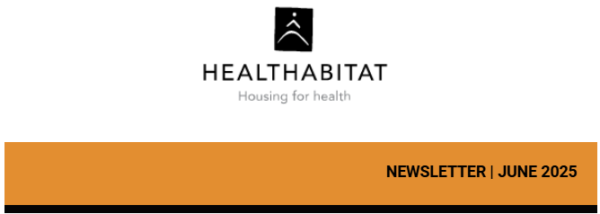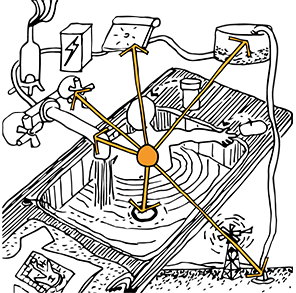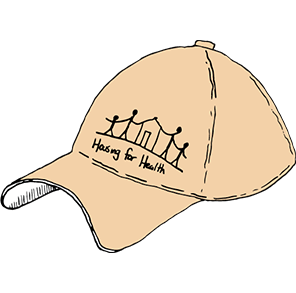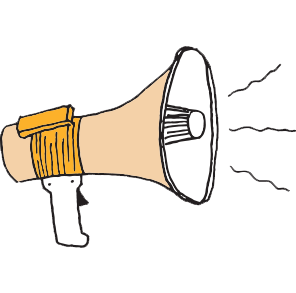NEWSLETTER | JUNE 2025

Healthabitat’s impact keeps growing. Your support means our team can keep improving the work we do and provide it to even more communities. Together, we’ve surveyed 10,779 houses across 286 Housing for Health projects, employing around 3000 Indigenous staff.
Since our last newsletter in December, we’ve been hard at work—on the ground running projects and using project data to push for better housing maintenance at state, territory, and national levels.
Want more updates between newsletters? Check out our news page and follow us on social media for stories, research, and housing and health news from across Australia and beyond.
And don’t forget, we’re still supporting vital sanitation projects in Nepal—click here to donate directly to that work, or here for general donations. Contact us directly if you would like to discuss supporting our work.
– The HH Team
Below is a snapshot of what HH has been up to and project updates…
Team Member training is now accredited!

Image: Team Members in Wellington complete assessments to have their HfH training accredited
In early 2025, we piloted formal accreditation for our Housing for Health Team Members—the local community members who carry out the vital work of surveying houses. The trial, which was hosted in the NSW Wellington Community by Project Manager, Jessica Spencer, was a success. All 10 Team Members completed their accreditation, along with the Acting Chairperson of the Wellington Local Aboriginal Land Council and Jessica herself. Huge thanks to everyone on the Wellington project for supporting this project!
This new accreditation gives Team Members a recognised unit of competency from the Certificate II in Indigenous Environmental Health. It’s a big step forward—creating new pathways to further training and employment in regional and remote communities where those opportunities are too often limited.
Thanks to the Strong and Resilient Communities (SARC) grant, we now have TAE-qualified trainers in Healthabitat, which will allow the staff who already travel on these remote projects to deliver the training. We are applying for further grant funding to cover all ongoing student and accreditation fees and are looking forward to trialling this on upcoming projects in the NT.
Thanks to Nirrumbuk Aboriginal Organisation and their RTO, Djaringo, for helping us achieve this.
People
New Project Manager
We are very excited to welcome Rachel Frearson as an accredited Project Manager. Rachel has a long Environmental Health background in remote NT communities. We have been privileged to have her expertise on many NT Housing for Health projects over the past few years in her former role with NT Health.

Image: Rachel Frearson (fourth from the left in the green shirt) fixing door handles in the NT
The National Team
In February, Healthabitat and Project Managers from around the country came together to share insights, successes, and new research on housing, health, and maintenance. These national meetings are vital—they give us a clear picture of what’s happening on the ground across Australia.
A key focus was the urgent need to prioritise temperature control in housing, especially in the face of climate change. We were privileged to hear from SA Housing about their ambitious Race to 2030 project, which is driving innovation in retrofitting housing to protect them against future climates.
This kind of collaboration ensures we keep learning, improving, and delivering the best outcomes for the communities we work with.

Image: February 2025 Project Managers Meeting (from Left to Right – Justine Playle, Tim Short, Rob Barnett, Kerryn Lawrence, Tim Sowerbutts, Greg Norman, Dave Donald, Karin Richards, Grant Stewart, Bobbie Bayley, Phil Hespe (SA Housing), Paul Torzillo, Lucy Minter, Claton Reeves (SA Housing), Jeff Standen, Jessica Spencer)
10 new Team Leaders
In March we ran new Team Leader training in NSW in March 2025 where we trained another 10 new Team Leaders to work on projects in NSW and also the NT.
Team Leader Refresher Training will be held in the NT alongside our current Top End projects later in the year, which will allow more local, NT-based people to be skilled up and work on the Housing for Health projects.
Local Team Feature
Rirratjingu Aboriginal Corporation (RAC)

Image: Rirratjingu employees perform maintenance work in around their community
In March and April, Healthabitat completed Survey-Fix 1 in Yirrkala, East Arnhem, NT. Led by Project Manager Bobbie Bayley and in partnership with Rirratjingu Aboriginal Corporation (RAC), the project employed local residents to survey 108 houses and engaged local trades to fix essential Health Hardware.
RAC, fully owned by the community, has been running property maintenance services since 2020 under contract with the NT Government— and currently looks after 130 homes in Yirrkala, including repairing blocked drains, leaking taps, electrical issues, gas leaks, and lock replacements. Through this work, RAC has created employment pathways and a large locally skilled Indigenous crew. We look forward to working with RAC again on Survey-Fix 2 in Yirrkala!
Housing for Health (HfH) Projects
HfH projects continue across Australia and internationally. In Australia, we currently have 12 projects underway with survey-fix work being done on 481 houses.
Northern Territory
In April, we completed Survey-Fix 1 (sf1) in Yirrkala and Gunyangara communities in the NT’s East Arnhem region. The Survey Fix is underway on 134 houses. These projects, along with projects in two other NT communities, will run between now and June 2027 as part of the NT Government’s Healthy Homes program.
We have been very fortunate to collaborate with great local organisations and stakeholders to make these projects possible, including Rirratjingu Aboriginal Corporation, Miwatj Health, Gumatj Aboriginal Corporation and the local DHLGCD department.
A shout out to community-controlled health organisation, Miwatj Health, for the brilliant posters they developed for the Housing for Health projects in the local Yolgnu language.

Image: Great HfH posters developed by Miwatj
New South Wales
Over the past 6 months, in partnership with NSW Health, 11 HfH projects are underway with survey-fix underway or completed in 344 houses. NSW Health continues to enhance these projects with their ongoing value-adding projects on issues such as climate adaptation and energy consumption. They are trialling an exciting solar panel project and doing extensive testing of their benefits to tenants.
Read more about the work of NSW Health, here.

Image: Survey team members on recent far Western NSW and Northern Rivers Housing for Health projects
Training community members to check trade work

Image: Checking Survey-Fix 1 (sf1) plumbing work
Making sure plumbers, electricians and carpenters do work to a high quality, that is free of any defects, and making sure nothing is missed, is critical for good quality solutions in communities. Female community members who were trained up at Survey-Fix 1 (sf1) on a recent project in Yirrkala, NT, returned for the next stage and were trained up to check the plumbing work orders in all the houses.
Advocacy wins!
We are actively advocating for regular, planned maintenance programs in remote communities instead of the usual “reactive” approach, where repairs only happen after something breaks and gets reported. This system often leads to long wait times for families.

For example, in the NT, sending a plumber from Alice Springs to the remote community of Kaltukatjara (Docker River) can cost between $6,662 and $7,954 in travel alone—before fixing anything. Because of these delays, tenants lose trust in the system and stop reporting problems. In one Housing for Health project, only 3% of over 800 fixable issues had been reported by tenants.
To solve this, we have been making recommendations for;
- Setting up regular “check and fix” programs—like a yearly car service that keeps everything running smoothly. This includes hiring local Aboriginal Housing Maintenance Officers who can do small repairs, report bigger problems, and be a trusted contact for the community. It also means doing regular checks on plumbing, electrical systems, air conditioning, pest control, and more. Larger upgrades should be planned using tools like asset reports and maintenance schedules.
- Starting small with a trial program and a dedicated team to show how well this can work.
We have recently been successful in convincing governments to invest in this and work with them to develop and role out a pilot program alongside Housing for Health projects – watch this space!
Nepal
Nepal Sanitation Projects
Healthabitat’s Nepal program Manager Bishnu Shrestha led a 2nd Survey-Fix in early June 2025 to all HH-developed school handwashing and toilet facilities, using the survey tool and toolbox developed by architecture students from the final University of Newcastle Sanitation Studio in 2019.
For just under $1500 AUD for the trip our local team has been able to keep the 5 water supply systems, 6 septic systems, 30 handwashing/tooth brushing outlets, one shower and 25 toilets fully functioning as the first of these systems approach their 8 year mark. These toilets must continue to function to positively impact the health of children and communities. To support future trips you can directly donate to this work here.

Image: Prabin Manadhar (plumber) and Triatna (carpenter) complete cyclical maintenance work June 2025
Other items of interest
Update! ‘Race to 2030’ APY Lands Energy Efficiency Retrofit Pilot Project
Healthabitat is still actively involved as a Project Partner in the project and is excited to be following along with the progress and findings.
As mentioned above, we were lucky to have Phil and Clayton join our Managers’ Meetings in Sydney in February to share project updates and findings. Recently, the project team worked with stakeholders and Behavioural Scientists from Monash University to create some brilliant energy education posters and videos in local languages for Anangu tenants.
From the Adelaide test rooms (mentioned in our December newsletter) and the monitoring of 12 retrofitted houses, early results show how different levels of upgrades affect thermal performance. SA Housing is now using these preliminary findings to guide retrofits under the Housing Australia Future Fund (HAFF).
Healthabitat is fortunate to be planning a trip to the APY Lands in June 2025 to assist with post-upgrade testing, measuring the impacts on air-tightness and improved indoor comfort.
The pilot is still set to finish in November 2025. Read more here.
We recently visited a nearly completed 3D-printed home in Sydney, built by Contour 3D, to explore its potential in addressing housing challenges. This technology offers faster construction times, reduced material waste, and the possibility of using local materials, presenting a quicker, cheaper, and more precise alternative to traditional methods.
However, challenges remain… Read more in our recent News Item.
Australia is still fighting trachoma—and it’s time to fix the root cause. This report confirms that Australia remains the only high-income country where trachoma still exists, mostly in remote Aboriginal communities in the NT, SA, and WA. While infection rates in children aged 5–9 have dipped below the WHO’s 5% elimination target, Healthabitat warns that progress won’t last without tackling poor living conditions.
We are urging governments to focus on the “E” in the WHO’s SAFE strategy —’Environmental improvements’ — like working showers, clean bathrooms, and less overcrowding. Read more in our recent News Item.
This article highlights the significant role of the Housing for Health program in addressing overcrowding and improving housing conditions for First Nations communities. While the report acknowledges the program’s impact, we emphasise the need for sustained, regular maintenance to ensure long-term housing functionality and health benefits.
Read more in our recent News Item.
To receive the 6 monthly newsletter directly to your inbox, subscribe here.









